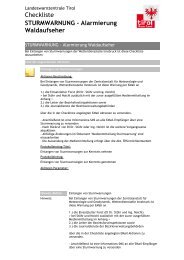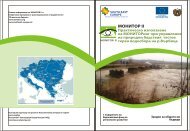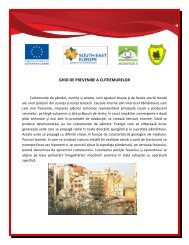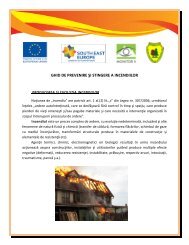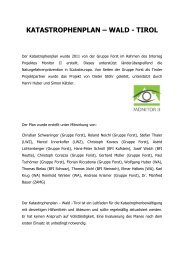risk management - monitor ii
risk management - monitor ii
risk management - monitor ii
You also want an ePaper? Increase the reach of your titles
YUMPU automatically turns print PDFs into web optimized ePapers that Google loves.
20 Monitor II Hazard maps<br />
Monitor II Hazard maps 21<br />
The theoretical return period is the inverse<br />
of the probability that a defined intensity of<br />
an event will be exceeded in any one year.<br />
For example, a 100-year flood has a 1%<br />
(1/100=0.01) chance of being exceeded in any<br />
one year and will on average occur once every<br />
100 years.<br />
As regards flood return period, it should<br />
be noticed that there are significant differences<br />
in the adopted boundaries. They reflect<br />
differences in national-regional legislations,<br />
spatial planning and design codes of protective<br />
structures.<br />
Hazard potential<br />
Hazard potential is derived by a heuristic<br />
matrix-based combination of return-period and<br />
intensity classes. This non-analytical approach<br />
results in non-unified hazard classifications<br />
among countries. For example in hazard assessment<br />
for floods Austria distinguishes only high<br />
and low hazard while Italy knows four hazard<br />
classes. It should also be noticed that there are<br />
discrepancies among countries regarding the<br />
colour assigned to a specific hazard class when<br />
used in hazard maps.<br />
FREQUENCY CLASS AUSTRIA SLOVENIA AUSTRIA ITALY ITALY<br />
Intensity<br />
Slovenia (PP4) Italy (PP5) Austria (PP1)<br />
Vulnerability<br />
Figure 17: Examples of frequency classes for floods based on the return period<br />
Figure 19: Examples of intensity classes for floods<br />
(PP1) (PP4) (Hora maps) (PP5) (PP7)<br />
High 1.5 m >1,5 m2/s >= 1,5 m >= 0,5 m >2 m<br />
Medium 0.5 - 1.5m 0.5 - 1,5 m2/s < 1,5 m < 0,25 m 0.5-2 m<br />
Low 11) &<br />
(=



